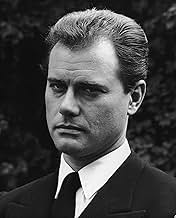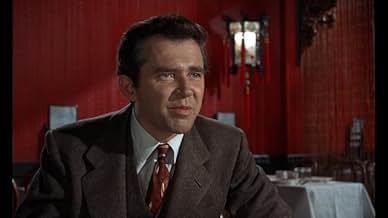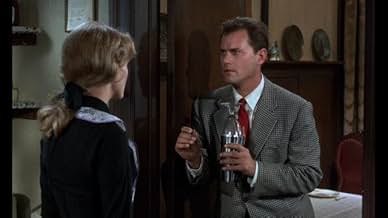AVALIAÇÃO DA IMDb
6,5/10
2,2 mil
SUA AVALIAÇÃO
Oito amigos inseparáveis da faculdade se envolvem em estilos de vida muito diferentes após a formatura.Oito amigos inseparáveis da faculdade se envolvem em estilos de vida muito diferentes após a formatura.Oito amigos inseparáveis da faculdade se envolvem em estilos de vida muito diferentes após a formatura.
- Direção
- Roteiristas
- Artistas
- Indicado para 1 prêmio BAFTA
- 3 indicações no total
Marion Brasch
- Radio Man's Wife
- (as Marion Brash)
- Direção
- Roteiristas
- Elenco e equipe completos
- Produção, bilheteria e muito mais no IMDbPro
Avaliações em destaque
Sidney Lumet is a masterful craftsman of socially aware drama that tackles important cultural questions, and even for its time, which was a time of radical social change that beginning to reflect on theater screens, The Group treated some divisive themes, for example the association of free love with progressive social revolution, and depicting it as a forerunner of a new anti-fascistic, anti-oppressive awareness and critique of marriage as a form of social bondage, not to mention contraception, abortion, lesbianism and mental illness. And owing to Lumet's subtle use of technical skills, The Group---possibly his biggest, least characteristic and least considered film---is a skillfully paced and giftedly acted adaptation of Mary McCarthy's novel charting the kismet of eight Vassar graduates, class of '33, up to the start of WWII. Sidney Buchman's script does some outstanding couture work on the material, clipping away all the adipose tissue and slashing the remaining into hundreds of pointed little scenes which are assembled as a charmingly droll montage of the decade, though Lumet's concerns are towards the thematic nature of McCarthy's story rather than the setting.
Joanna Pettet is quite convincing as the one who marries Larry Hagman's prototype self-destructive aspiring writer, there's an impressive debut by Kathleen Widdoes, and as does the great Hal Holbrook, and Candice Bergen as a Paris refugee who returns courted by a German countess. But the most memorable performance for me is by Jessica Walter, who is now exercising great comic ability on a wholly new generation of television such as Arrested Development and Archer. There is a real conflict between who she is on the inside and out that she portrays so authentically and epitomizes a familiar but difficult-to-depict personality. Also Joan Hackett, in a BAFTA-nominated debut performance of her own, provides an especially varied array of emotional conversion. And willowy, eye-catching ginger leading lady Elizabeth Hartman displays her versatility between her upper-class collegiate role here and the capricious, heartbreaking flirt she played in Francis Ford Coppola's debut film You're a Big Boy Now the same year.
Director of Long Day's Journey into Night, The Pawnbroker, Murder on the Orient Express, Dog Day Afternoon and Network, Lumet is noted for drawing award-winning performances from his casts. Chiefly cunning in this, his tenth film, is the way in which the girls, each one elegantly and idiosyncratically characterized, are seen to develop individually. For example viewing the Hackett of the closing scenes, bigheaded wife of an Arizona oil-man, subtly changing physically as well, and almost certainly a mainstay of the local ladies' league, and recalling her first, desperately bold affair with a Greenwich Village painter, one thinks with amazement that's just how she might become.
With Boris Kaufman's superbly striking cinematography to appreciate, the Kurosawa-style multi-plane tableaux of various characters in single painterly shots, demonstrating a poetic and caring property in his capturing of these layered images, a quality that marked his extraordinarily noble career, The Group is a vividly experiential chronicle of the girl-to-woman sexual and social transitions as the characters try on sex, religion and politics. It's the thinking viewer's Sex and the City.
Joanna Pettet is quite convincing as the one who marries Larry Hagman's prototype self-destructive aspiring writer, there's an impressive debut by Kathleen Widdoes, and as does the great Hal Holbrook, and Candice Bergen as a Paris refugee who returns courted by a German countess. But the most memorable performance for me is by Jessica Walter, who is now exercising great comic ability on a wholly new generation of television such as Arrested Development and Archer. There is a real conflict between who she is on the inside and out that she portrays so authentically and epitomizes a familiar but difficult-to-depict personality. Also Joan Hackett, in a BAFTA-nominated debut performance of her own, provides an especially varied array of emotional conversion. And willowy, eye-catching ginger leading lady Elizabeth Hartman displays her versatility between her upper-class collegiate role here and the capricious, heartbreaking flirt she played in Francis Ford Coppola's debut film You're a Big Boy Now the same year.
Director of Long Day's Journey into Night, The Pawnbroker, Murder on the Orient Express, Dog Day Afternoon and Network, Lumet is noted for drawing award-winning performances from his casts. Chiefly cunning in this, his tenth film, is the way in which the girls, each one elegantly and idiosyncratically characterized, are seen to develop individually. For example viewing the Hackett of the closing scenes, bigheaded wife of an Arizona oil-man, subtly changing physically as well, and almost certainly a mainstay of the local ladies' league, and recalling her first, desperately bold affair with a Greenwich Village painter, one thinks with amazement that's just how she might become.
With Boris Kaufman's superbly striking cinematography to appreciate, the Kurosawa-style multi-plane tableaux of various characters in single painterly shots, demonstrating a poetic and caring property in his capturing of these layered images, a quality that marked his extraordinarily noble career, The Group is a vividly experiential chronicle of the girl-to-woman sexual and social transitions as the characters try on sex, religion and politics. It's the thinking viewer's Sex and the City.
8tavm
Just watched for the second time in my life this Sidney Lumet adaptation of Mary McCarthy's novel "The Group", this time on Netflix streaming. It's about eight women who graduated from Vassar in 1933 and their trials and tribulations during that time and subsequent years through the beginning of the second World War. Among those women, the standout for me was Shirley Knight as Polly who goes from an affair with a publisher boss (Hal Holbrook) of one of her friends to falling for a doctor (James Broderick) she works for. She also willingly suffers a father (Robert Emhardt) who's eventually diagnosed as manic depressive. Emhardt's performance is perhaps the most enjoyable to me since he talks up a storm and says such inappropriately funny lines! It was also fascinating to see Larry Hagman play a role here not too different from his later iconic evil character of J.R. Ewing on both versions of "Dallas" only here, he's not such a fun person to watch. I was also pleasantly surprised to find out that the Richard Mulligan and Joan Hackett characters were awkward to each other but the actors would eventually marry in real life not long after. Oh, and Candice Bergen, for all her reputation of not being much of an actress during her early career, acquits herself nicely among her more trained co-stars in the few scenes she has here. In summary, The Group perhaps comes on a bit fast at the beginning to really get an understanding of what's going on and who these people are but eventually it slows down enough that you do get to know and mostly like these people as the film progresses. In the words of many of the characters of this film, "Who'd a thunk it?"
Sidney Lumet directed this busy, bustling, chatty character study-cum-soaper concerning eight Vassar graduates in 1933 who take different paths in life but always manage to stay in touch. Writer-producer Sidney Buchman nearly pulls off the heady task of adapting Mary McCarthy's well-loved novel to the screen, despite insurmountable story obstacles, a self-defeating length, and a persistent claim from professional critics at the time that maybe a female screenwriter should have been hired instead to adapt McCarthy's prose (Pauline Kael was the most vocal in this area). With much crisscross editing between apartments, hospitals, and places of employment, it's nearly impossible to determine how many years pass in the course of the story--and this episodic structure leaves Candice Bergen's Lakey and Mary-Robin Redd's Pokey with hardly any screen-time. Joan Hackett as Dottie makes a very appealing impression in her early scenes (falling for heartless womanizer Richard Mulligan), but then she too disappears. There's far too much of Joanna Pettet in the overtly-showy role of Kay (and with her comes Larry Hagman, doing nothing new in the impossible role of Kay's hard-drinking, womanizing husband). Elizabeth Hartman as Priss and Shirley Knight as Polly end up doing the finest acting work, with Knight practically carrying the film's final third--but then, the screenplay is tipped towards our liking those characters the most (if Jessica Walters' gossiping Libby was revealed to have half a heart, we might feel the same towards her). The scattershot humor is there, but it's always undercut by sourness--which is then replaced with grimness. If Buchman was inappropriate as the writer, Lumet was equally a questionable choice as director. He keeps the pacing lively, but the film is far more vitriolic than nostalgic. **1/2 from ****
I saw this film last night and was absolutely stunned by how excellent it was. Not only did it seem to be one of the first 'chick flicks' (sorry for anyone who hates that title) but it was incredibly brave to deal with extremly contentious issues. The colours and the costumes in the film made the film seem like a true snapshot for life for seven educated women getting by in the first half in the century. It did not shy away from the issues of sex, and mental illness which is brave for a film made over thirty years ago. I started watching this film because I couldn't sleep but ended up watching it until 2.30am defintely entertaining and possibly superior to 'The Prime of Miss Jean Brodie'??
but this film is interesting for the cast, and the time period it depicts. Also the costumes are rather amusing. I have not yet read the book although several reviews have mentioned the time warp factor. Candice Bergen is in an early role as member of an elite group of Vassar graduates. Joan Hackett, Joanna Pettet, Larry Hagman (as her alcoholic husband), Hal Holbrook, James Broderick, Jessica Walter (as swinging single gossip in the NY publishing world), Kathleen Widdoes, Carrie Nye, Elizabeth Hartman and several other notable appearances make for an interesting cast. Some of the dialog will take you back to a different time. The controversy of breast over bottle feeding, Republican vs. FDR Democrat (there are some pretty amusing scenes between Priss (Elizabeth Hartman) and her pediatrician husband, a Republican, who says after her second miscarriage this will give him a bad reputation in the hospital (!). Obviously, the book may be more interesting, and less histrionic. Jessica Walter is very good, and amusing; wish she had done more films in the 80's and 90's (She was great in "Slums of Beverly Hills", with Alan Arkin, as well). I do not watch regular television although several have mentioned she is very good in the Ron Howard comedy "Arrested Development". At any rate, a good escapist film, which I would not completely dismiss as soap opera, since there are skilled actors and some worthwhile dialog. 8/10.
Você sabia?
- CuriosidadesLongstanding rumor has suggested that producer Charles K. Feldman, having already bought the film rights to Mary McCarthy's novel in advance of publication, made sure it would be a best-seller by sending employees to bookstores all over America to buy up numerous copies of it. The prestige accruing to the book allowed him and Sidney Lumet to make the film with unknown actors and without too much interference.
- Erros de gravaçãoThe setting is supposed to be between 1933-40, however some of the ladies' hairstyles reflect the styles of the mid-60s. Libby (Jessica Walter) is the most notorious of the group, her up-do with pigtails at Kay & Harald's party being the most obvious of the styles.
- ConexõesFeatured in The 77th Annual Academy Awards (2005)
Principais escolhas
Faça login para avaliar e ver a lista de recomendações personalizadas
- How long is The Group?Fornecido pela Alexa
Detalhes
- Data de lançamento
- País de origem
- Idioma
- Também conhecido como
- The Group
- Locações de filme
- Connecticut College, New London, Connecticut, EUA(college campus)
- Empresa de produção
- Consulte mais créditos da empresa na IMDbPro
Bilheteria
- Orçamento
- US$ 2.400.000 (estimativa)
- Faturamento bruto mundial
- US$ 90
- Tempo de duração
- 2 h 30 min(150 min)
- Cor
- Proporção
- 1.66 : 1
Contribua para esta página
Sugerir uma alteração ou adicionar conteúdo ausente

































